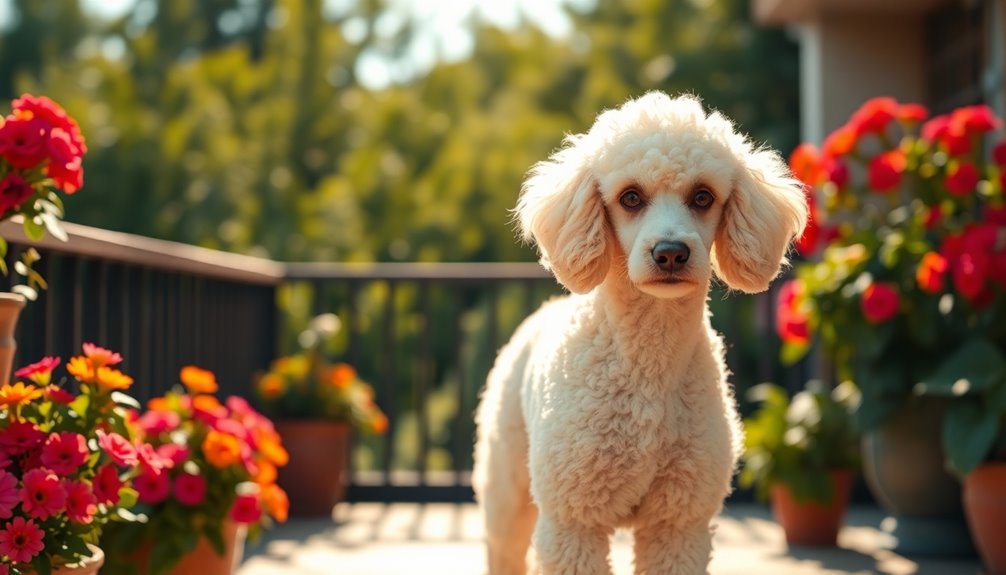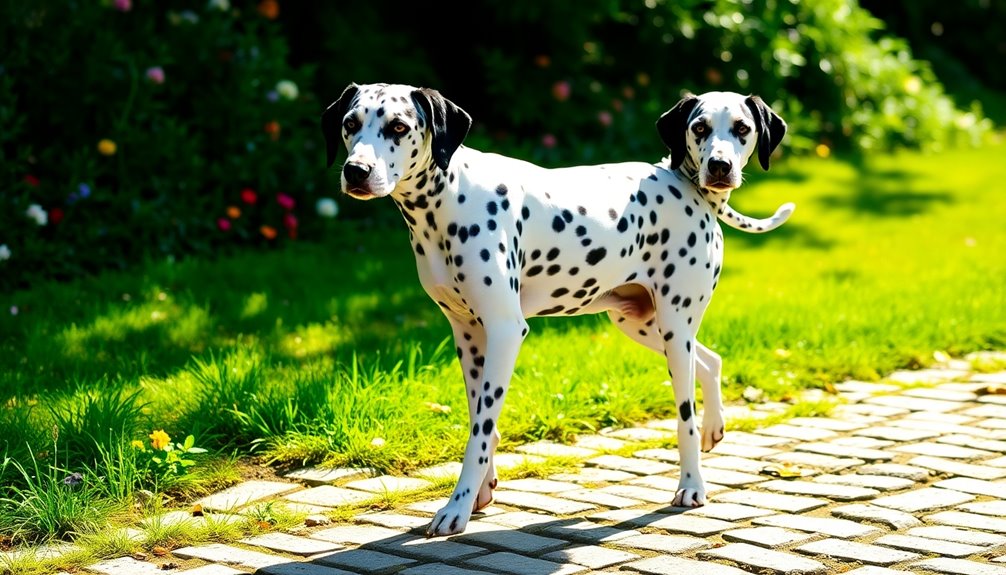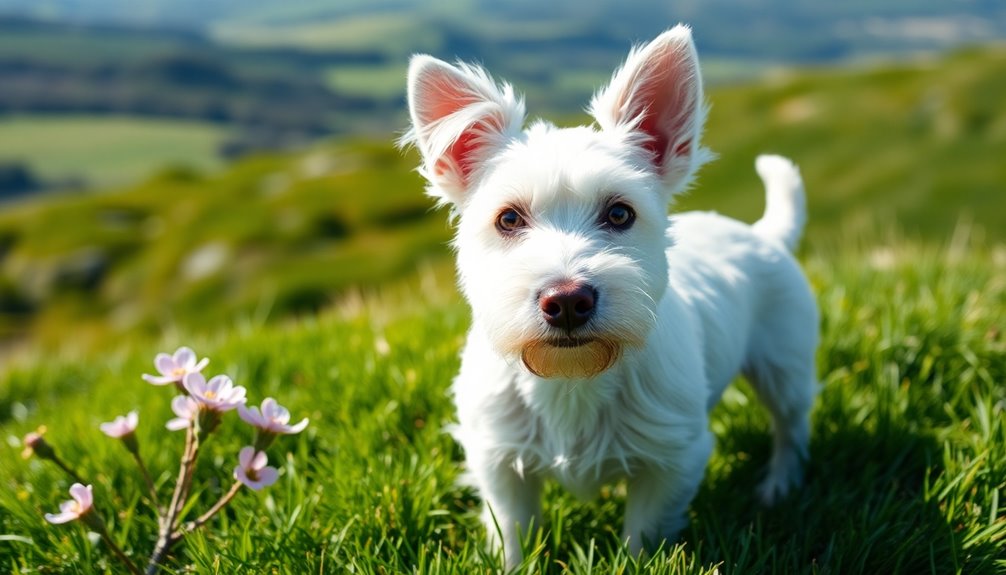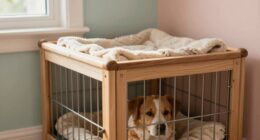Poodles are the perfect mix of intelligence and style, making them exceptional companions. Whether you choose a toy, miniature, or standard size, their hypoallergenic coats are great for allergy sufferers and don't shed much. These dogs, originally bred in Germany for hunting, have a long history of royal companionship. With their playful nature and quick learning ability, they're easy to train. Poodles thrive on daily exercise and socialization, adapting well to various living situations. Their unique looks and charming personality are just the beginning; there's so much more to discover about these fabulous canines.
Key Takeaways
- Poodles are highly intelligent and rank as the second smartest dog breed, excelling in learning commands quickly.
- Their stylish appearance is characterized by a distinctive dolichocephalic face, floppy ears, and diverse coat colors and textures.
- Poodles are hypoallergenic, making them suitable for allergy sufferers with minimal shedding and reduced dander.
- They adapt well to various living situations, thriving in both urban apartments and homes with ample space for play.
- Regular grooming and exercise are essential for maintaining their health and stylish appearance, ensuring they remain active and well-kept.
Introduction

When you think of a stylish and intelligent dog, the poodle often comes to mind. Known for their unique curly coats and elegant appearance, poodles come in three sizes: toy, miniature, and standard. Depending on the variety, they can weigh anywhere from 4 to 70 pounds and stand up to 15 inches tall or more. Their coat colors are diverse, ranging from apricot to silver, adding to their visual appeal.
Beyond their looks, poodles are renowned for their high intelligence and affectionate nature. They bond closely with their families and are often friendly, though they might be a bit standoffish with strangers initially. Their energy levels are high, requiring regular exercise and mental stimulation to keep them happy and engaged. This breed is known for its active lifestyle, making it well-suited for families who enjoy outdoor activities.
If you're considering getting a poodle, be prepared for a dog that thrives in an active lifestyle and enjoys playtime.
Despite their low shedding, poodles demand a commitment to grooming due to their curly coats. With a lifespan of 10 to 18 years, they can be a long-term companion, but they do require proper care to avoid health issues.
History and Origin
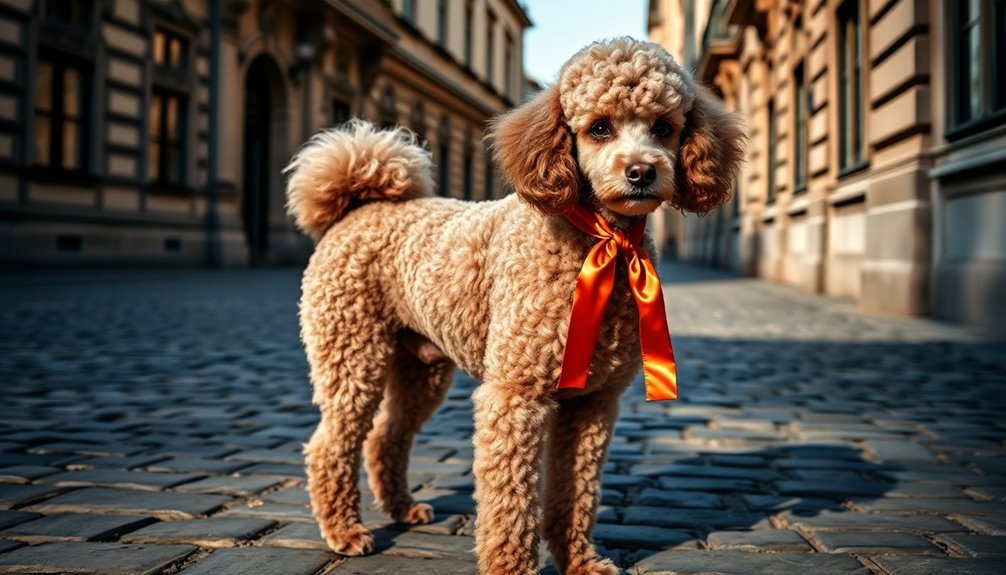
The Poodle's origins spark debate, with some saying it hails from Germany while others point to France.
Initially bred as a water retrieving dog, these intelligent canines also captivated audiences with their circus performances. Poodles have been recognized by the UK Kennel Club in 1874 and the AKC in 1886, solidifying their status as a beloved breed.
Understanding their history gives you insight into their unique skills and charm.
Where and when the breed originated
Poodles likely trace their origins back to Germany during the Middle Ages, where they were initially bred as skilled duck hunters. Most historians agree that the breed developed in this region, with its name derived from the Low German word "puddeln," which means "to splash." By the 15th century, these dogs were already recognized for their hunting capabilities, specifically in retrieving waterfowl.
While some believe the Poodle also originated in France, this notion isn't as widely accepted. The breed gained popularity in France during the 1600s, but its roots are firmly planted in German soil. The Poodle likely resulted from crosses between various European water dogs, including Spanish and Portuguese breeds, which contributed to its unique characteristics. Moreover, Poodles were utilized for fishing and hunting in Germany, showcasing their versatility.
Interestingly, the North African Barbet is thought to be one of the breed's ancestors, influencing its distinctive curly coat. Additionally, Asian herding dogs may have played a role in enhancing the Poodle's intelligence and agility.
Although other theories suggest origins from Russia or Northwest Africa, the German lineage remains the most credible and celebrated in the history of this intelligent and stylish canine.
Water Retrieving and Circus Performance
Having established the Poodle's origins as a versatile water retriever, it's clear that this breed's skills were highly sought after for hunting. Bred to retrieve waterfowl from cold waters, Poodles excelled in their athleticism and adaptability. Their unique, corded coats helped them shed water effectively, allowing them to dry quickly after a swim.
In various European countries, including Germany and Portugal, Poodles were invaluable hunting companions, especially known as "Rough Water Dogs" in England. Additionally, their use as truffle dogs in France showcases their remarkable abilities beyond water retrieval.
Their high intelligence and trainability made them masters of both hunting and retrieval tasks, enabling them to perform remarkably well in challenging conditions. While Poodles are often associated with circus performances today, historical records don't show a direct link between the breed and circus acts. The name "Poodles" does connect to the renowned trick rider Edwin "Poodles" Hanneford but is unrelated to the breed itself.
Over time, Poodles adapted to various roles beyond water retrieving. Their versatility has allowed them to thrive in different sizes as companion dogs, proving their intelligence and trainability in many activities beyond their initial purpose.
Physical Characteristics
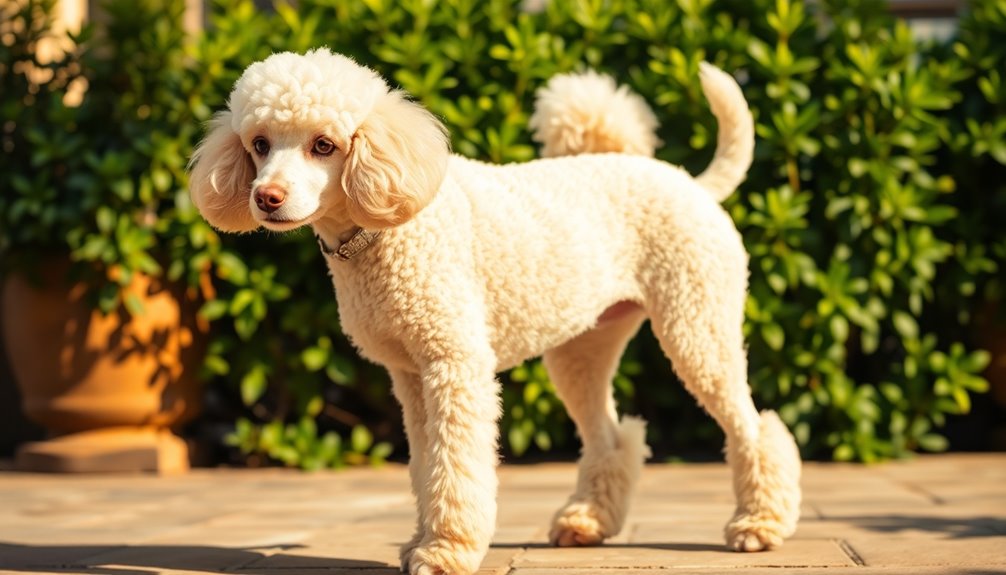
When you think about Poodles, their size and coat immediately stand out.
Whether you're drawn to the robust Standard or the petite Toy, each type has its unique weight and height.
Plus, their curly, hypoallergenic fur makes them a stylish and practical choice for many dog lovers. Additionally, their high trainability allows them to excel in various activities and commands, making them a joy to train.
Size, weight, and coat details
Standard Poodles are known for their impressive stature and elegant appearance, making them a standout choice among dog breeds. When it comes to size, male Standard Poodles typically stand between 23 and 27 inches tall, while females range from 18 to 24 inches. Regardless of gender, all Standard Poodles must be taller than 15 inches, with most adults reaching 18 to 24 inches at the withers.
In terms of weight, males generally weigh between 60 and 70 pounds, while females weigh around 40 to 50 pounds. At six months, you'll find males weighing about 41 to 48 pounds and females around 28 to 34 pounds. By one year, males reach their full weight of 60 to 70 pounds, and females settle at 40 to 50 pounds. Size genetics can vary significantly within a single litter, which means you might see a range of sizes even among puppies from the same parents.
These large dogs feature a dolichocephalic face and floppy ears, embodying both style and functionality. Their size demands adequate resources for care, including food, grooming, and veterinary attention.
You'll need to ensure they get daily exercise and mental stimulation to keep them happy and healthy, given their energetic nature.
Curly, Hypoallergenic Fur Texture
With their distinctive curly coats, Poodles showcase a unique blend of style and practicality that sets them apart in the canine world. Their soft, tightly wound curls aren't just visually striking; they also serve a functional purpose. These dense curls minimize shedding and trap dander, making Poodles one of the least allergenic dog breeds.
While no dog is completely hypoallergenic, you'll find that Poodles significantly reduce allergens in your home. To maintain that beautiful coat, daily brushing is essential. This routine prevents tangling and matting, which can lead to hair loss and skin irritation. You'll also need to schedule regular trims since their hair never stops growing. Regular grooming is crucial to ensure the coat remains healthy and free from matting.
Bathing your Poodle every one to two months helps keep their coat clean, but be sure to use the right shampoo to avoid irritation. Curly coats typically start developing in puppies around 6 to 8 months, settling fully by 12 to 18 months. Remember, genetics can influence the texture and curliness of their fur, so you might notice variations among Poodles.
Temperament and Personality

When you think of a Poodle, you immediately picture a playful and intelligent companion ready to engage with you and your family. Their adaptable nature makes them suitable for families, individuals, or even multi-pet households. With their love for play and social interaction, Poodles truly shine in any loving environment. Their hypoallergenic coat makes them an excellent choice for families with allergies.
Playful and Intelligent Nature
Poodles embody a lively spirit, making them one of the most playful breeds you'll encounter. They thrive on regular physical activity, so daily walks or runs are essential for keeping them happy and healthy. If you have a Standard Poodle, they'll need more space to romp around, while Toy and Miniature Poodles can get their exercise indoors but still require engaging activities.
With their remarkable intelligence, Poodles rank as the second smartest dog breed, learning new commands quickly and obeying them almost flawlessly. They can grasp around 300 words, showcasing their impressive cognitive abilities. This impressive intelligence level is comparable to that of a 2.5-year-old human.
To keep your Poodle stimulated, consider agility classes that challenge both their mind and body, as they excel in this environment. Without enough physical and mental engagement, your Poodle might resort to destructive behavior, so it's vital to provide them with intelligence games and challenging toys.
Their friendliness and social nature mean they love being the center of attention, bonding quickly with family. Overall, Poodles bring a unique combination of playfulness and intellect, making them a delightful companion.
Suitability for families, individuals, or other pets
For families, individuals, and those with other pets, Poodles offer a versatile and affectionate companion. They bond quickly with family members, making them loyal friends. If you have kids, Poodles generally do well, especially when socialized properly. Miniature Poodles are particularly good for families with small children due to their size. Poodles also thrive on mental stimulation, which is essential for their happiness and well-being.
Poodles are adaptable, thriving in various living situations, including apartments. Their active lifestyle means they fit right in with families who enjoy outdoor activities. Plus, they respond well to positive reinforcement, which is ideal for family dynamics.
For individuals, Toy Poodles shine as affectionate companions. They thrive on social interaction and need regular mental stimulation, so if you can commit to their training, you'll have a happy pet. Poodles are sensitive, requiring gentle communication, making them perfect for patient owners.
When it comes to other pets, Poodles are social and enjoy companionship. They typically get along well with friendly breeds like Labrador Retrievers and Beagles. Just remember to supervise introductions to ensure everyone feels comfortable.
With the right environment, Poodles can harmonize beautifully within a diverse household.
Health and Lifespan
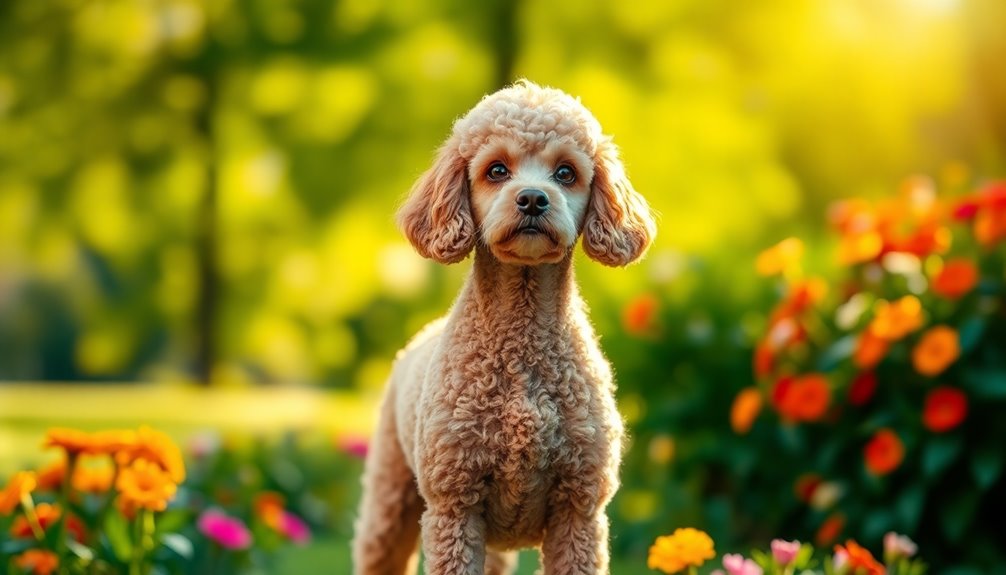
When it comes to your Poodle's health and lifespan, understanding their typical lifespan is just the beginning. You should also be aware of common health concerns and genetic predispositions that can affect their longevity. Additionally, factors such as nutrition and exercise play a crucial role in enhancing your Poodle's overall health and extending their lifespan.
Typical lifespan of the breed
Understanding the typical lifespan of Poodles can help you prepare for the joys and responsibilities of pet ownership. Generally, Poodles live between 12 to 15 years, but this can vary significantly based on their size.
Toy and Miniature Poodles tend to live longer, with lifespans of 14 to 18 years. In contrast, Standard Poodles have a shorter average lifespan, ranging from 12 to 15 years.
Some individual Poodles can thrive to an impressive age of 18 years or more, especially with proper care. The oldest recorded Poodle lived between 24 to 26 years, highlighting the potential for longevity in this breed.
Factors influencing a Poodle's lifespan include genetics, living conditions, diet, and exercise. Providing a stress-free environment, a balanced diet, and regular exercise can enhance their overall health and longevity. Additionally, breed-specific health concerns can impact a Poodle's lifespan, making awareness and regular monitoring essential.
Additionally, routine veterinary visits play a crucial role in managing health issues early on.
Common health concerns or genetic predispositions
While Poodles can have a long lifespan, being aware of their common health concerns and genetic predispositions is vital for ensuring their well-being.
Poodles are prone to several genetic conditions, such as GM2 Gangliosidosis, which affects the nervous system, and Osteochondrodysplasia, leading to skeletal issues. Progressive Retinal Atrophy (PRA) can cause blindness, while Von Willebrand's Disease affects blood clotting. Additionally, genetic testing can help identify over 270 genetic health conditions, allowing owners to make informed decisions about their Poodle's health.
Endocrine problems like Addison's Disease and thyroid issues are also prevalent, along with Cushing's Disease, which involves excess cortisol. Toy and Miniature Poodles are particularly susceptible to hypoglycemia, while bloat remains a serious concern across all varieties.
Orthopedic issues, including hip dysplasia and Legg-Calve-Perthes Disease, can impact mobility. Additionally, collapsing trachea is common in smaller Poodles, leading to respiratory challenges.
Neurologically, seizures due to epilepsy can occur, alongside skin issues like sebaceous adenitis and allergies.
Lastly, bladder stones can create painful urinary problems. Staying vigilant about these conditions will help you provide the best care for your Poodle, ensuring a healthier, happier life together.
Tips for maintaining health and wellness
To ensure your Poodle thrives, it's essential to prioritize their health and wellness through a combination of proper nutrition, regular veterinary care, exercise, and grooming.
Start with a balanced diet rich in antioxidants, vitamins, and minerals. Choose high-quality dog food with protein as the first ingredient, aiming for 18-25% protein and 5-8% fat. Avoid toxic human foods like chocolate and grapes, and always provide fresh water. Reducing sugar intake can also benefit their overall health, as excess sugar can lead to dental issues.
Regular veterinary care is vital. Schedule annual check-ups to catch any health issues early and keep vaccinations up to date. Don't forget dental care; brush your Poodle's teeth regularly and consider annual dental check-ups. Regular veterinary check-ups are also essential for maintaining overall health and well-being.
Exercise is crucial for their physical and mental well-being. Aim for at least 30 minutes to an hour of daily walks, and mix in activities like fetch or agility training. Keep their minds engaged with interactive games and offer socialization through playdates.
Finally, prioritize grooming. Brush your Poodle weekly to prevent mats, and bathe them with suitable dog shampoo. Clean their ears weekly to avoid infections.
With these tips, you'll help your Poodle maintain a long, healthy, and happy life.
Care Requirements
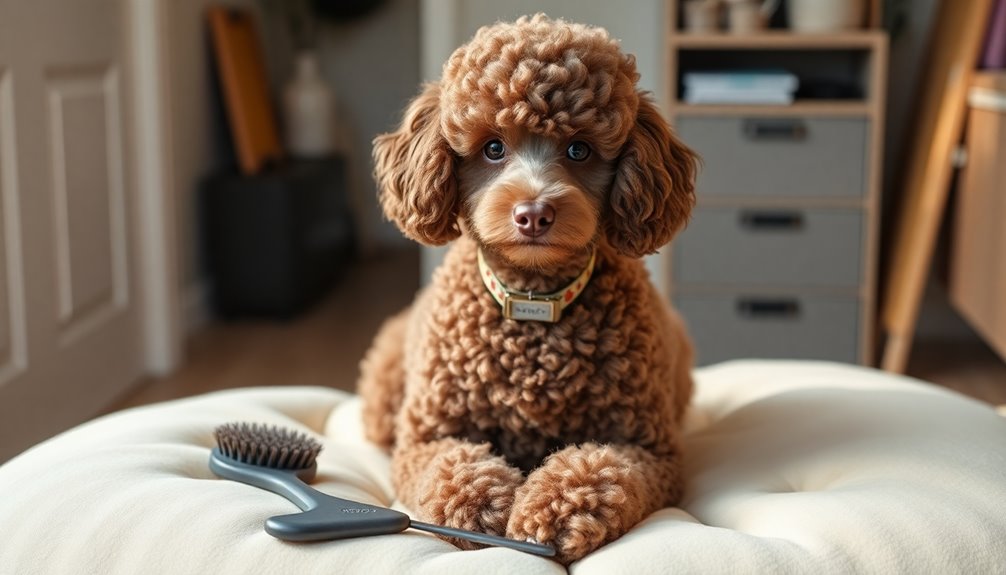
Caring for your poodle involves regular trimming to maintain their iconic coat and meet their exercise needs. You'll need to ensure they get daily activity to keep their energy levels in check. Additionally, paying attention to their diet is crucial for their overall health and well-being. Regular grooming is essential to prevent matting complications that can arise from their unique hair type.
Regular Trimming Required
Regular trimming is essential for keeping your Poodle's coat healthy and looking its best. You'll want to schedule professional grooming every 4-6 weeks to maintain that stunning appearance and prevent matting. For certain coat types, visits every 6-8 weeks are also recommended.
Regular trims help avoid overgrown hair, especially around sensitive areas like the eyes and ears, ensuring your Poodle stays comfortable. Additionally, regular grooming contributes to overall well-being and appearance, ensuring a top-quality coat.
At home, it's crucial to establish a grooming routine. Brush your Poodle daily to prevent tangling and matting, particularly if your Poodle has longer hair. Aim for at least 3-4 times a week if daily isn't feasible. Use a slicker brush and wide-toothed comb to gently detangle and remove loose fur, focusing on areas prone to mats.
Different coat types require tailored grooming schedules. For instance, curly coat Poodles need daily brushing, while straight coat Poodles can manage with brushing every few days.
Don't forget about additional tasks like ear cleaning, eye care, and nail trimming every 3-4 weeks, all of which contribute to your Poodle's overall health and comfort. Proper grooming keeps your Poodle looking stylish and feeling great!
Exercise requirements and energy levels
Poodles are energetic dogs that thrive on daily exercise and mental stimulation. You should aim for at least 1 to 2 hours of exercise each day, breaking it up into 20- to 30-minute intervals. Activities like walking, playing fetch, and engaging in interactive games keep your Poodle physically fit and mentally sharp. Regular exercise should be divided into intervals throughout the day based on the dog's age and needs.
For puppies, opt for shorter, gentler sessions to protect their developing joints. Walking at a brisk pace is a great low-impact option, but don't hesitate to incorporate running, swimming, or agility training for added excitement. Standard Poodles, in particular, love the water, making swimming an excellent choice.
As your Poodle matures, energy levels stabilize, but adult dogs still require consistent exercise to prevent boredom and hyperactivity. Adult Poodles need approximately 60 minutes of exercise daily to support their health and well-being. Seniors may need less intense workouts but should still engage in regular activities to maintain their well-being.
Feeding tips and diet recommendations
When it comes to feeding your Poodle, understanding their specific nutritional needs is essential for maintaining their health and vitality. Poodles require high-quality proteins, with puppies needing at least 22% and adults around 18% of their daily intake.
Essential fats, especially Omega-3 and Omega-6 fatty acids, support their energy levels and coat health; fish oil and flaxseed are great sources. For carbohydrates, focus on complex options like sweet potatoes and brown rice, which provide sustained energy. Always ensure their food includes a balanced mix of vitamins and minerals to support their immune function.
Tailor their diet to their life stage, adjusting for puppies, adults, and seniors. Choose high-quality dog food with lean meats as primary ingredients and avoid fillers like corn or wheat. Nutritional needs evolve from puppyhood to adulthood, necessitating adjustments based on age and activity level.
Measure portions accurately to prevent obesity, especially in toy breeds. Feed your adult Poodle 1 to 2.5 cups of dry food daily, divided into two meals. Consider customizing their meal plans with different proteins and veggies, and consult your vet for supplements or breed-specific formulas.
Always avoid harmful foods like chocolate and onions to keep your Poodle safe and healthy.
Training and Socialization
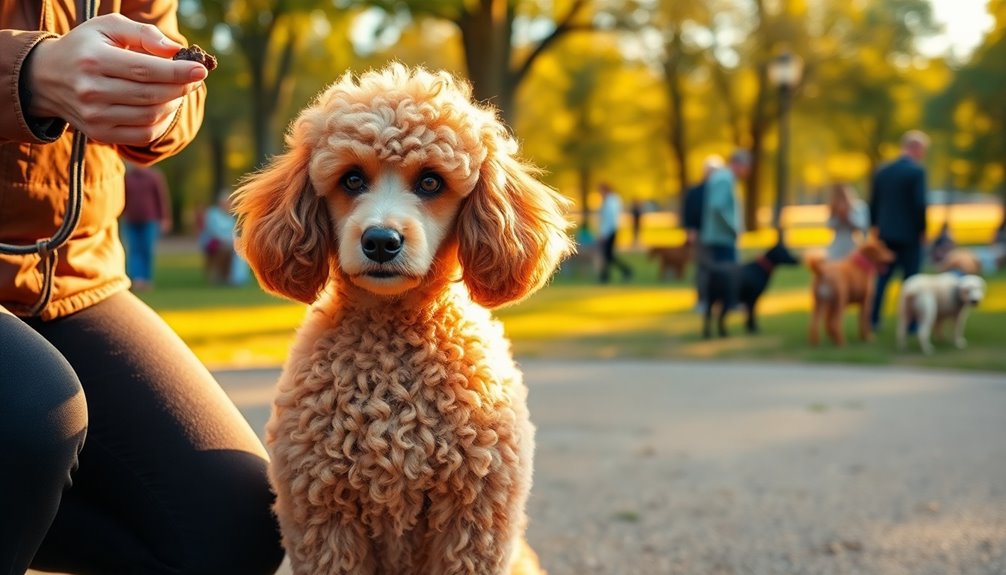
When it comes to training your Poodle, you're in for a rewarding experience since they're highly trainable and eager to please. You'll want to introduce them to positive experiences early on, as this helps build their confidence and adaptability. Starting training at 6-8 weeks establishes a strong foundation for commands and socialization. Don't forget, though, that separation anxiety can be a concern, so fostering independence through gradual alone time is essential.
Highly Trainable and Eager
The remarkable intelligence and eagerness to please make poodles some of the most trainable dogs around. They're quick learners, effortlessly picking up patterns without needing much motivation beyond the occasional treat.
You'll find they excel in both basic obedience and advanced tasks, including tricks and agility courses. Their intelligence allows them to adapt to various environments, making training a breeze. This adaptability is further enhanced by early socialization, which builds their confidence and reduces future fears. Engaging in interactive learning toys can similarly stimulate cognitive growth in young children, showcasing the importance of play in development.
To keep your poodle engaged, keep training sessions short and stimulating, starting around five minutes and gradually extending to ten. Consistent use of positive reinforcement, like praise and treats, is essential for effective training.
Given their sensitivity, harsh punishments can backfire, so focus on encouragement instead. Starting training as early as eight weeks old is beneficial, and many reputable breeders initiate this process before sending puppies to their new homes.
Regular, consistent training prevents boredom and reinforces that eagerness to please. By fostering this positive learning environment, you'll unlock your poodle's full potential and strengthen your bond.
With patience and commitment, you'll witness just how incredibly trainable and eager your poodle truly is.
Introduce Through Positive Experiences
Building on your poodle's impressive trainability, introducing them to new experiences through positive reinforcement is key to their development. Start by using the capture and shape method: reward desired behaviors with treats and praise as you gradually shape their responses.
Begin with simple commands like 'come' and 'sit,' and consider using clicker training for precise timing. Utilize the lure to obedience method by guiding your poodle into positions with treats, and provide immediate rewards to reinforce good behavior. Pair hand signals with verbal cues to enhance their understanding, ensuring you practice these consistently in various environments.
Keep training sessions short, around 10-15 minutes, and conduct them 2-3 times daily to maintain focus and prevent boredom.
For socialization, begin early between 3 to 14 weeks, exposing your poodle to different people, environments, and situations gradually. Organize supervised play sessions with well-socialized dogs to encourage positive interactions. Positive experiences are essential in building a confident and well-adjusted companion, as they help mitigate the effects of any adverse experiences during development.
Always reinforce good behavior with treats and praise, and be patient as you desensitize your poodle to new stimuli. This positive approach will lay a strong foundation for a confident and well-adjusted companion.
Separation Anxiety in Poodles
Separation anxiety can be a significant challenge for poodle owners, often stemming from their strong attachment to you and their high intelligence. Poodles may show signs of anxiety due to genetic predisposition, traumatic early-life experiences, or even your own behavior, like excessive pampering. Changes in your routine can also trigger their anxiety.
You might notice symptoms like destructive behavior, excessive vocalization, or even house soiling when they're left alone. To help your poodle cope, start with gradual desensitization by leaving them alone for short periods, gradually increasing the time. It is important to recognize that many breeds are also prone to this condition, which can help you understand the challenges your poodle faces.
Counterconditioning is effective too—associate your departures with positive experiences, like treats or toys. Creating a safe space for your poodle can provide comfort when you're away. Ensure they get plenty of exercise and mental stimulation through activities like puzzle toys.
Obedience training can also help them feel secure. If the anxiety persists, don't hesitate to seek professional help. In severe cases, veterinarians may recommend medication. Establishing a consistent routine and considering alternatives like dog daycare can further ease your poodle's anxiety and promote a happier, healthier life.
Ideal Living Environment
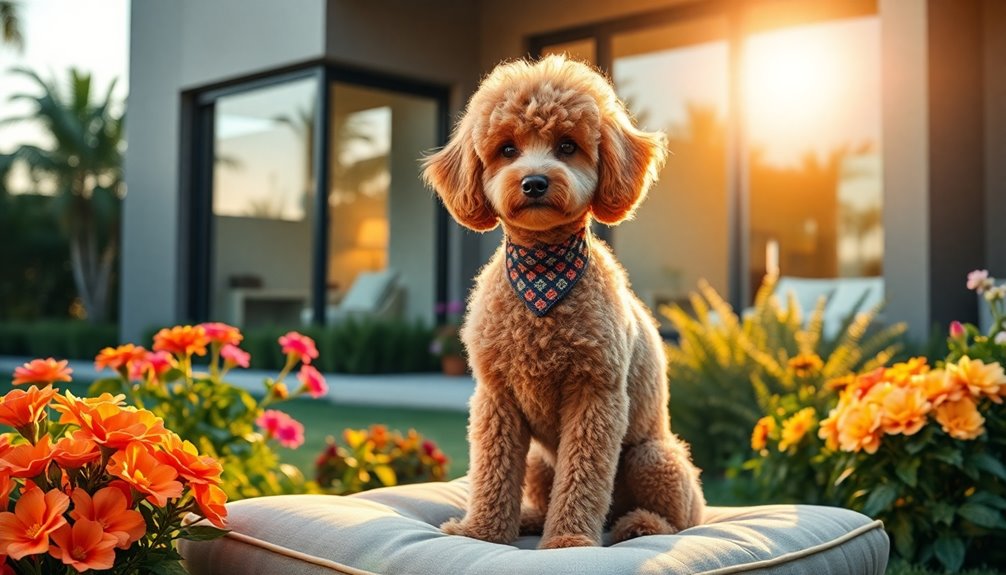
If you live in an urban apartment, don't worry—your poodle can thrive there with the right care. They adapt well to mild to warm climates, making them perfect companions for various living environments. Just ensure they get enough outdoor time and mental stimulation to keep them happy and healthy. Regular exercise, such as fetch or hikes, will enhance their physical and mental well-being. Additionally, engaging in activities that promote cognitive development can significantly improve their overall behavior and adaptability.
Urban Apartment Living
In urban settings, poodles thrive in apartment living thanks to their adaptability and manageable size. Miniature and toy poodles are perfect for small spaces, while standard poodles can also adjust if you provide enough room and regular exercise.
Effective space management is key; create designated areas for sleeping and playing, and keep your living space uncluttered to prevent accidents.
Daily exercise is crucial for your poodle's well-being. Miniature poodles need around 45 minutes of playtime or walks each day to stay energized. Regular physical activity helps manage their energy and prevents health issues, as poodles are an active breed that requires daily movement.
Living in an apartment offers excellent opportunities for socialization through daily walks and interactions with neighbors and other pets.
Grooming is essential, too. Poodles require regular brushing and professional grooming every few weeks to maintain their unique coat and minimize shedding. This routine not only keeps your poodle looking stylish but also helps keep your apartment clean.
Lastly, poodles are sociable and get along well with people and other pets. Early socialization and proper training will ensure they behave well in your apartment, making it a harmonious living situation for everyone.
Tolerates Mild to Warm Climates
Poodles possess an impressive adaptability that makes them well-suited for mild to warm climates. They thrive comfortably in temperatures above 40°F (4.4°C) and can handle moderate warmth with ease. Their curly, thick coats provide some insulation against cooler weather, but you'll want to avoid exposing them to extreme cold, especially if your Poodle is a puppy or a senior. Signs of discomfort can include shivering or reluctance to go outside. Additionally, it's important to note that older dogs may struggle more with temperature regulation, making them more susceptible to cold stress.
In warmer climates, ensure your Poodle has access to shaded areas and plenty of water to stay hydrated. Regular exercise is vital, but be mindful of the heat—walks during cooler parts of the day are best.
Indoors, create a cozy, draft-free space for your Poodle to relax. If you're in a particularly hot area, consider using fans or air conditioning to keep the environment comfortable.
While Poodles can manage various climates, watch out for extreme temperatures that could jeopardize their health. With proper care, socialization, and attention to their needs, your Poodle will thrive in a mild to warm climate, enjoying both outdoor adventures and cozy indoor moments.
Hypoallergenic Coat Benefits Owners

If you're looking for a dog that fits your stylish lifestyle and minimizes allergy concerns, poodles might be your best bet.
Their unique hypoallergenic coat not only reduces shedding but also makes them a favorite among royalty and in popular culture, like in "The Aristocats." Additionally, their curly coats trap pet dander, which helps to reduce airborne allergens in your home.
With a poodle, you can enjoy companionship without the constant worry of allergens in your home.
Royalty's Preferred Companion Breed
Royalty's affection for Poodles has long cemented this breed's status as a favored companion, showcasing their unique blend of intelligence and elegance.
Originating as hunting dogs in the 15th century, Poodles quickly captured the hearts of European nobility. King Louis XVI of France and Queen Anne of Denmark both cherished these dogs, with the latter's beloved Poodle, "Boy," becoming a symbol of royal companionship. Poodles were originally bred for retrieving waterfowl, highlighting their exceptional skills and versatility.
Poodles were prized for their intelligence, athleticism, and distinctive curly coats, which provided insulation in cold water. Their adaptability transformed them from water retrievers to noble lapdogs, fitting seamlessly into the luxurious lifestyles of the French courts.
The emphasis on appearances in these courts led to Poodles being groomed elaborately, enhancing their appeal among the elite.
Moreover, Poodles' hypoallergenic coats made them ideal companions for allergy-sensitive individuals, a trait that persists today. With little shedding and less dander, they're a great choice for families concerned about allergies.
Their regal history and hypoallergenic qualities not only showcase their royal pedigree but also make them a practical choice for modern owners who value both style and health.
Poodles in "The Aristocats
The charm of Poodles extends beyond their elegance, offering significant benefits for allergy sufferers, as seen in their portrayal in "The Aristocats." With their hypoallergenic coats, these dogs minimize shedding and dander, making them a practical choice for families concerned about allergies. Their unique curly or hair-like coats trap dander, reducing its release into the environment, which means you can enjoy their company without worrying about allergic reactions. Furthermore, the reduction in allergens aligns with the principles of sustainable practices that aim to promote healthier living spaces.
As an owner, you'll appreciate the enhanced allergy relief these dogs provide. Poodles produce lower levels of allergenic dander, improving indoor air quality and making it easier for those with respiratory conditions to breathe comfortably. Additionally, their lack of undercoats helps in managing allergens effectively.
Grooming them requires some effort, as they need specialized haircuts every few months and regular grooming, but their low shedding means less frequent brushing and a cleaner environment overall.
Moreover, Poodles are generally healthier due to their minimal shedding, which reduces bacteria and dirt build-up on their coat. This contributes to their good behavior and training ease, making them a delightful addition to your household.
In "The Aristocats", their charm and hypoallergenic qualities shine, making them ideal companions for allergy sufferers.
Active Lifestyle Compatibility

Poodles fit seamlessly into various lifestyles, whether you live in a bustling city or a quiet suburb. Their grooming needs may require some time investment, but the rewards of a well-cared-for coat are worth it. If you're ready for a long-term commitment, a Poodle can be a stylish and active companion for years to come. Regular exercise enhances overall health and longevity, making them not only beautiful but also vibrant pets.
Versatile for Various Lifestyles
While many dog breeds can fit into active lifestyles, Poodles truly shine with their adaptability and energy. They thrive on at least an hour of exercise daily, broken into manageable 20-30 minute sessions. You'll find that walking is an excellent low-impact option, suitable for all Poodle sizes.
If you're up for it, high-energy activities like jogging, playing fetch, or engaging in dog sports can provide the physical stimulation they love.
For active families, Poodle mixes like Goldendoodles and Labradoodles are perfect. These energetic breeds require consistent exercise and mental stimulation, making them ideal companions for hiking or jogging adventures. They excel in environments that encourage physical activities, ensuring they stay happy and well-adjusted. Also, Goldendoodles and Labradoodles are known for their friendly and intelligent nature, enhancing their compatibility with families.
Poodles also adapt well to various living situations, including apartments. As long as they receive regular exercise and mental enrichment, they can thrive in smaller spaces.
Toy and Miniature Poodles are particularly suited for apartment living, while Standard Poodles can do well with ample outdoor time. Remember, interactive play and regular walks are crucial to keep your Poodle content, regardless of your living situation.
Grooming Needs and Time Commitment
Maintaining a Poodle's grooming routine is essential for their health and comfort, especially if you lead an active lifestyle. For Poodle puppies, you'll need to brush them daily or every other day to prevent matting. As they grow into adults, brushing 2-3 times a week will keep their coat looking great. Bathing should be done as needed with dog-specific products to maintain skin health. Regular maintenance helps prevent matting and tangling in their curly coats, which is crucial for their overall comfort.
Investing in the right tools is crucial. A slicker brush helps remove tangles, while a bristle brush keeps the outer curls in check. Electric clippers and scissors make trimming and maintenance easier, ensuring your Poodle remains comfortable and stylish.
Don't forget about nail care—trimming every 2-4 weeks is important to prevent discomfort and maintain proper gait.
Regular ear cleaning is vital to avert infections, especially for those with floppy ears. Professional grooming every 6-8 weeks can help keep your Poodle's coat in top shape, but regular home grooming is equally important.
This routine not only enhances their appearance but also allows you to check for any potential health issues, keeping your active companion happy and healthy.
Frequently Asked Questions
How Do I Choose the Right Poodle Size for My Home?
To choose the right poodle size for your home, consider your living space and lifestyle.
If you live in a small apartment, a Toy Poodle might be ideal.
For a bit more room, a Miniature Poodle strikes a balance between size and energy.
If you have ample space and an active lifestyle, a Standard Poodle could be perfect.
What Activities Do Poodles Enjoy Outside of Training?
Poodles enjoy a variety of outdoor activities beyond training.
You can take them for a game of fetch in the park, where they can run and retrieve. Frisbee is another fun option that challenges their agility.
Swimming in lakes or pools will keep them cool and engaged. Nature walks let them explore and enjoy the sights and smells.
Don't forget seasonal activities like playing in leaf piles or visiting pet-friendly pumpkin patches!
Are Poodles Good With Children and Other Pets?
Yes, poodles are generally great with children and other pets. Their patient and gentle nature makes them ideal companions for kids, while their intelligence helps them adapt to various play styles.
When introducing poodles to other pets, be sure to supervise interactions, especially with larger breeds. With proper training and socialization, poodles can thrive in a family environment, forming strong bonds and providing companionship for both children and other animals.
How Can I Tell if My Poodle Is Bored or Anxious?
To tell if your poodle is bored or anxious, watch for signs like excessive chewing, digging, or hyperactivity.
If they pace, bark, or jump on you when you return home, they might be feeling restless.
Look for destructive behaviors, like unrolling toilet paper or pulling stuffing from toys.
Also, if your poodle struggles with being alone, it could indicate separation anxiety.
Keeping them mentally stimulated can help alleviate both boredom and anxiety.
What Are Some Common Myths About Poodles?
You might hear that poodles are high-maintenance and snobby, but that's just a myth. They require regular grooming like many breeds, and they're actually friendly and eager to please.
Another misconception is that they're just pretty faces; poodles are intelligent and excel in various dog sports.
Plus, they come in three sizes—Standard, Miniature, and Toy—making them suitable for different lifestyles.
Lastly, while their coats reduce dander, they aren't completely hypoallergenic.
Conclusion
In conclusion, poodles are the perfect blend of intelligence and style, making them wonderful companions for active individuals and families alike. Their rich history, unique physical traits, and friendly personalities enhance their appeal. With proper training and socialization, you'll find that they adapt well to various living environments. Plus, their hypoallergenic coats are a significant bonus for allergy sufferers. If you're looking for an engaging and loyal canine friend, a poodle might just be your ideal match!

